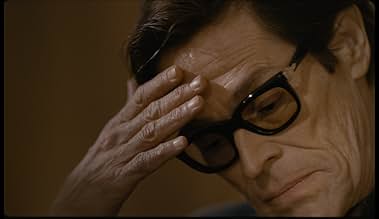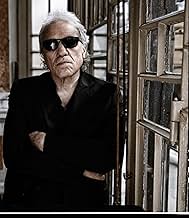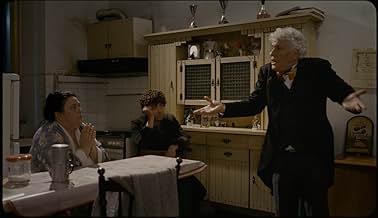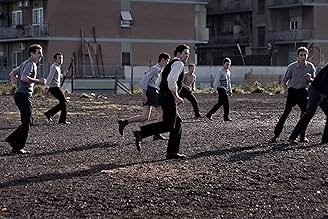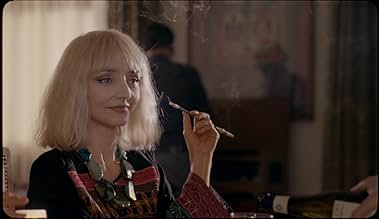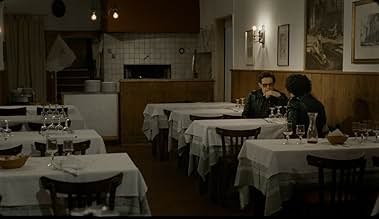AVALIAÇÃO DA IMDb
5,9/10
4,8 mil
SUA AVALIAÇÃO
Um olhar caleidoscópico sobre o último dia do cineasta italiano Pier Paolo Pasolini, em 1975.Um olhar caleidoscópico sobre o último dia do cineasta italiano Pier Paolo Pasolini, em 1975.Um olhar caleidoscópico sobre o último dia do cineasta italiano Pier Paolo Pasolini, em 1975.
- Direção
- Roteiristas
- Artistas
- Prêmios
- 2 vitórias e 5 indicações no total
Luca Lionello
- Narrator
- (narração)
Guillaume Rumiel Braun
- Interviewer
- (as Lucien Rumiel)
- Direção
- Roteiristas
- Elenco e equipe completos
- Produção, bilheteria e muito mais no IMDbPro
Avaliações em destaque
Abel Ferrara's long-gestated biopic of Pier Paolo Pasolini has its congenital defect, by cast Willem Dafoe (albeit his striking physical resemblance) as the maestro, hence, the prominent anglophone dialog is rightly incongruous with its milieu and becomes more problematic because the rest Italian cast must follow suit, even for the venerable actress Adriana Asti, who plays Pasolini's senior mother, during a family and friend home-gathering, has to awkwardly keep the conversation going in her heavily accented English, that is a misstep to cut right through a naturally intimate occasion where could have spoken volumes of the internal discord. This language hitch is too big to ignore also because it is erratic, Dafoe manages to converse small talks in Italian (although the credit on IMBb listing that the voice is dubbed), but when he needs to express Pasolini's ideology, he switches to English, as he confesses during the interview with journalist Furio Colombo (Siciliano), paraphrasing here "it is better for me to write than speak about my thoughts", so Ferrara's indecision to stick to one solution chips away the film's potency.
The film begins just days before Pasolini's shocking demise, but Ferrara judiciously doesn't tap into the juicier conspiracy theories spawned from it henceforth, and Dafoe's performance is restrained most of the time, pensively buries his self-consciousness of the impending quietus, his Pasolini is benevolent, intelligent and impermeable. The film only fitfully weaves flashback into its slender narrative (an 84-minute length), the sexual experience in his youth and rambling, indeterminate thoughts, but one of the merits is that Ferrara pays his reverence to piece together Pasolini's unfinished film, envisioning an idiosyncratic "messiah-seeking" journey starring Pasolini's "great love of his life" Ninetto Davoli as Epifanio and Riccardo Scamarcio as Davoli himself answering their calling and witnessing an annual heterosexual copulation ceremony (in the name of procreation) between gays and lesbians (celebrated with pyrotechnics) en route until a cosmic ending commensurate with Pasolini's own fate.
The film is chromatically enveloped with a blue-tinted pall of a grubby Rome in the 70s, and when the brutal crunch finally descends on the night of November 2nd, 1975, Ferrara chooses a more pedestrian cause for the attack but injects his condemnation with one glimpse-or-you-will-miss-it shot where the homophobic perpetrators run over a badly beaten Pasolini when hurrying off the place in his vehicle, it could be the final blow extinguishing his last breath, whether it is intentional or accidental, either way, Ferrara hits home with the happening's incomprehensible cruelty.
Poignancy reaches its apex in Asti's heart-rending breakdown through Maria de Medeiros' Laura Betti, attendant with Callas' stentorian threnody. Ferrara's PASOLINI is a disciple's deferential and cerebral homage to a mentor, whom he has never met and whose myth has been perpetuating around us ever since the horrific tragedy.
The film begins just days before Pasolini's shocking demise, but Ferrara judiciously doesn't tap into the juicier conspiracy theories spawned from it henceforth, and Dafoe's performance is restrained most of the time, pensively buries his self-consciousness of the impending quietus, his Pasolini is benevolent, intelligent and impermeable. The film only fitfully weaves flashback into its slender narrative (an 84-minute length), the sexual experience in his youth and rambling, indeterminate thoughts, but one of the merits is that Ferrara pays his reverence to piece together Pasolini's unfinished film, envisioning an idiosyncratic "messiah-seeking" journey starring Pasolini's "great love of his life" Ninetto Davoli as Epifanio and Riccardo Scamarcio as Davoli himself answering their calling and witnessing an annual heterosexual copulation ceremony (in the name of procreation) between gays and lesbians (celebrated with pyrotechnics) en route until a cosmic ending commensurate with Pasolini's own fate.
The film is chromatically enveloped with a blue-tinted pall of a grubby Rome in the 70s, and when the brutal crunch finally descends on the night of November 2nd, 1975, Ferrara chooses a more pedestrian cause for the attack but injects his condemnation with one glimpse-or-you-will-miss-it shot where the homophobic perpetrators run over a badly beaten Pasolini when hurrying off the place in his vehicle, it could be the final blow extinguishing his last breath, whether it is intentional or accidental, either way, Ferrara hits home with the happening's incomprehensible cruelty.
Poignancy reaches its apex in Asti's heart-rending breakdown through Maria de Medeiros' Laura Betti, attendant with Callas' stentorian threnody. Ferrara's PASOLINI is a disciple's deferential and cerebral homage to a mentor, whom he has never met and whose myth has been perpetuating around us ever since the horrific tragedy.
Defoe is not demanded. A documentary would be more enjoyable, if this could be said.
"To scandalize is a right to be scandalized is a pleasure" -Pier Paolo Pasolini
Lisbon & Estoril Film Festival #4
Pasolini was undeniably one the Festival's highlights, I considered it a must see and so did many because the theater was packed. Not only we were going to see the picture but we were also have the opportunity of hearing Maria de Medeiros (who's in the picture) reading some of Pier Paolo's poems and then after words of having a talk with Abel Ferrara. I was pretty excited, but I really just hoped for a decent movie.
Pasolini is Directed by Pier Paolo Pasolini and it stars Willem Dafoe, Maria de Medeiros, Riccardo Scamarcio, Giada Colagrande, Adriana Asti and Tatiana Luter.
To be sincere I left disappointed, I mean this is just not a good movie. Still though I'm glad I saw it and I'm glad I had this experience, it was worth it even if just to see Abel Ferrara. I'm a fan of the man, I have seen very little of his filmography but he certainly made an impression on me and on the rest of the audience that stayed. The highlight was the interview bit, Ferrara was a bit off the hook, very loose, feeling at home, cursing and being super sarcastic and honest at the same time. It's sad but yeah, I think Ferrara himself had more energy and life than the picture. Even sadder because you could see that Ferrera was an admirer of Pier Paolo's work.
In Pasolini we follow the last few hours of Pier Paolo's life, as we follow him through his lunch with his family, through an interview, through his memories and ultimately his death. This kind of narrative can work, this idea has definitely worked out in the past but it doesn't here. It's incredible to see how the film lost focus and control of it's narrative, even though it was only 80 minutes long and even though the concept is so simple. I felt lost and emotionally unmoved by it all. Sequences like the "film sequence" of the picture are scenes that ruined the movie.
I was actually extremely surprised to see how little Pasolini (Willem Dafoe) there actually was in the picture, it was almost as though he's a supporting character in his own picture. It's as though there is no lead actor. Some people say that that was a good thing, that less is more and I agree to some extent, I admire the unsentimentally with which the story is told but that ultimately led into becoming a cold picture. Pasolini, a man whose life was so fascinating since he was revolutionary figure with his ideas and his approach to art plus the controversy and talk that he brought with him. I wanted to take a look into the man's thoughts, ideas, I wanted insight, I guess that was what I was looking for and that I did not get.
Before seeing the film, I was so excited to see Willem Dafoe impersonating Pier Paolo, in the end though, we don't even see that much from him. When he's on screen he's able to capture something true and he grabs the screen, however his performance is far from memorable which is disappointing. There's not enough of him. Dafoe is good while on screen and one example is the interview scene, which is the highlight of the picture. The mood and tension are palpable and Dafoe owns it.
The audience and I were left disappointed, as I could hear whispers saying "I didn't like it". Many immediately left the theater and didn't wait for the highlight which was Ferrara's presence. He was more entertaining and had more life than the film itself. A film that feels awfully pale, with little to say. It's a little bit of a mess, from underdeveloped characters and plot, to bad narrative construction choices. Dafoe's performance and Ferrara's love for the picture were not enough to save the film.
Rating:C-
Lisbon & Estoril Film Festival #4
Pasolini was undeniably one the Festival's highlights, I considered it a must see and so did many because the theater was packed. Not only we were going to see the picture but we were also have the opportunity of hearing Maria de Medeiros (who's in the picture) reading some of Pier Paolo's poems and then after words of having a talk with Abel Ferrara. I was pretty excited, but I really just hoped for a decent movie.
Pasolini is Directed by Pier Paolo Pasolini and it stars Willem Dafoe, Maria de Medeiros, Riccardo Scamarcio, Giada Colagrande, Adriana Asti and Tatiana Luter.
To be sincere I left disappointed, I mean this is just not a good movie. Still though I'm glad I saw it and I'm glad I had this experience, it was worth it even if just to see Abel Ferrara. I'm a fan of the man, I have seen very little of his filmography but he certainly made an impression on me and on the rest of the audience that stayed. The highlight was the interview bit, Ferrara was a bit off the hook, very loose, feeling at home, cursing and being super sarcastic and honest at the same time. It's sad but yeah, I think Ferrara himself had more energy and life than the picture. Even sadder because you could see that Ferrera was an admirer of Pier Paolo's work.
In Pasolini we follow the last few hours of Pier Paolo's life, as we follow him through his lunch with his family, through an interview, through his memories and ultimately his death. This kind of narrative can work, this idea has definitely worked out in the past but it doesn't here. It's incredible to see how the film lost focus and control of it's narrative, even though it was only 80 minutes long and even though the concept is so simple. I felt lost and emotionally unmoved by it all. Sequences like the "film sequence" of the picture are scenes that ruined the movie.
I was actually extremely surprised to see how little Pasolini (Willem Dafoe) there actually was in the picture, it was almost as though he's a supporting character in his own picture. It's as though there is no lead actor. Some people say that that was a good thing, that less is more and I agree to some extent, I admire the unsentimentally with which the story is told but that ultimately led into becoming a cold picture. Pasolini, a man whose life was so fascinating since he was revolutionary figure with his ideas and his approach to art plus the controversy and talk that he brought with him. I wanted to take a look into the man's thoughts, ideas, I wanted insight, I guess that was what I was looking for and that I did not get.
Before seeing the film, I was so excited to see Willem Dafoe impersonating Pier Paolo, in the end though, we don't even see that much from him. When he's on screen he's able to capture something true and he grabs the screen, however his performance is far from memorable which is disappointing. There's not enough of him. Dafoe is good while on screen and one example is the interview scene, which is the highlight of the picture. The mood and tension are palpable and Dafoe owns it.
The audience and I were left disappointed, as I could hear whispers saying "I didn't like it". Many immediately left the theater and didn't wait for the highlight which was Ferrara's presence. He was more entertaining and had more life than the film itself. A film that feels awfully pale, with little to say. It's a little bit of a mess, from underdeveloped characters and plot, to bad narrative construction choices. Dafoe's performance and Ferrara's love for the picture were not enough to save the film.
Rating:C-
Part hero worship, part true-crime tragedy and completely of a piece with its creator's obsessions over the spiritual and the sordid. An unconventional approach to what should be a straightforward biopic, Pasolini's willingness to get lost within the artist's creative perspective while detailing his life creates a powerful and evocative look into the dark world of one of cinema's most controversial figures. It may be only one man's version of what many have speculated about... but its clear-eyed grittiness is also a tribute from a filmmaker for whom the night's temptations were ripe and its dangers legion. In depicting Pasolini's final hours, director Abel Ferrara emphasises the tranquil, serene environment in which his subject worked, the foundation of domesticity that anchored him, though ultimately could not shield him. Despite Ferrara's attempts to generate scandalous imagery of his own, he winds up with many sequences of touching beauty. The jumbling of languages offers a way forward, reaching towards a medium in which modes of communication become equivalent, offset by the marvellous central performance of one of cinema's greatest actors, Willem Dafoe. The idea of a search is a significant parallel between the two intertwined portions of the film, which seem to work towards opposing ends yet culminate in the conclusion of a common node: the art of Pier Paolo Pasolini is inseparable from his death.
a homage. and a sketch. visual poem. and touching story. not very clear but useful for remind a splendid work. a director. and crumbs from his universe. a film who must see twice. or more. because it is a kind of puzzle. and not the presence of Ninetto Davoli or the physical resemblance between Dafoe and Pasolini is the best side but the story itself. the last days of a man in search of the real form of truth. it seems be obscure or too complicated. it seems be only a drawing and not real a coherent film. but it is admirable axis for reflection. about the themes of Pasolini's filmography. about the subjects, decisions and idealism. about Salo meanings. about sense of art. about new adaptation of the Renaissance 's ideal. about a form of revolt and freedom and fight to discover the essence of existence behind masks.
Você sabia?
- CuriosidadesNinetto Davoli, who plays Epifanio in this film, has acted in many of Pier Paolo Pasolini's films and was, for a period of time, his lover. He is also a character in the film, played by Riccardo Scamarcio.
- Erros de gravaçãoLaura Betti (Maria de Medeiros) brings a record as a gift to Pasolini and mentions that it is "traditional Croatian music", but the song that is played from the record is in fact Macedonian.
- Citações
Pier Paolo Pasolini: Let me be frank to you.
Pier Paolo Pasolini: I have been to hell and I know things that don't disturb other people's dreams
- ConexõesFeatured in Sportin' Life (2020)
Principais escolhas
Faça login para avaliar e ver a lista de recomendações personalizadas
- How long is Pasolini?Fornecido pela Alexa
Detalhes
Bilheteria
- Faturamento bruto nos EUA e Canadá
- US$ 30.757
- Fim de semana de estreia nos EUA e Canadá
- US$ 8.362
- 12 de mai. de 2019
- Faturamento bruto mundial
- US$ 551.192
- Tempo de duração1 hora 24 minutos
- Cor
- Mixagem de som
- Proporção
- 1.85 : 1
Contribua para esta página
Sugerir uma alteração ou adicionar conteúdo ausente



